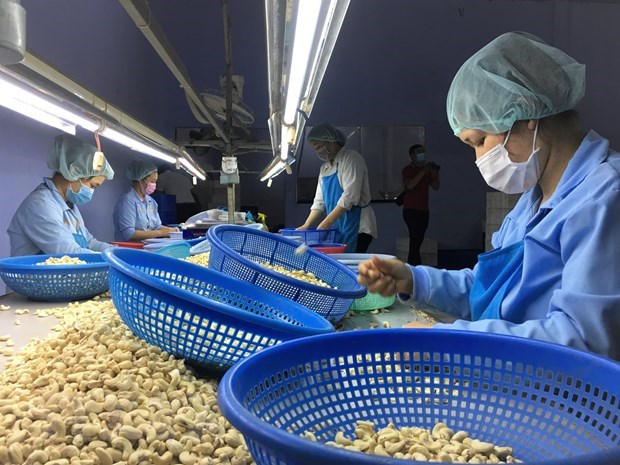SWIFT ban on Russia poses certain but temporary difficulties for payments in agricultural trade
That Russia is excluded from the Society for Worldwide Interbank Financial Telecommunication (SWIFT) will pose certain but possibly temporary difficulties for payments of Vietnam’s trade transactions, and agricultural traders will find out new payment methods soon, insiders said.
 Vietnamese workers process cashew nuts. (Photo: VNA)
Vietnamese workers process cashew nuts. (Photo: VNA)Dang Hoang Giang, Secretary General of the Vietnam Cashew Association, said the SWIFT ban on Russia will surely expose Vietnamese businesses to a number of payment difficulties, especially when it comes to Russian partners, since SWIFT is currently a popular network for international payments used by most banks in the world, including Vietnam, to safely conduct payments for export and import transactions.
However, apart from SWIFT, there are still other choices like IBAN, but its coverage is not as wide as SWIFT’s, he said, noting that businesses will find out new payment methods and also need assistance from banks.
Do Ha Nam, Chairman of the Intimex Group JSC, said such the export volumes of Vietnamese agricultural products as cashew, peppercorn, and coffee to Russia are not much. His company as well as many other firms do not often sell products directly to this market but via other European countries.
Russian importers also usually purchase farm produce through Eastern European countries, he said, forecasting that they are likely to switch to import via China and make payments by using other currencies in the time ahead.
Truong Dinh Hoe, Secretary General of the Vietnam Association of Seafood Exporters and Producers (VASEP), held that in the short term, the exclusion of Russia from SWIFT will not have much impact on the aquatic export value but affect the psychology and trade transactions of the exporters to this market.
About 50 Vietnamese firms have been licensed to export fishery products to Russia. Some have delivered goods to Russian partners but yet to receive payments, and they are worrying about this problem, he pointed out.
Besides, the depreciation of the Russian ruble is likely to undermine this market’s import capacity, so many Vietnamese businesses that plan to boost shipments to Russia may have to make reconsideration, according to Hoe.
Some enterprises also expressed their concern about the soaring fuel and fertiliser prices triggered by the Russia-Ukraine tensions.
Nam said if fuel prices keep rising, transportation expenses will also continue growing, causing more difficulties for farm produce exporters.
Dao Huu Duy Anh, General Director of the Duc Giang Chemicals Group JSC, said Russia is currently a large exporter of NPK fertiliser to Vietnam, so fertiliser prices may increase further due to the affected supply./.













